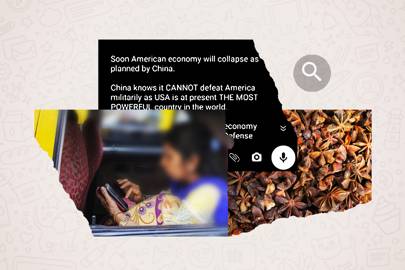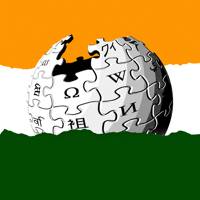
In March 2021, after almost one year away from home, I finally went to see my family in India. During the time I had spent away from home, I had started working in the realm of disinformation monitoring, and witnessed the surge of hoaxes and inaccuracies about the pandemic taking over social media. On my first night back in India, while watching TV with my parents, my mom’s phone started buzzing. Annoyed, I picked up her phone, only to realise she’d received a torrent of Covid-related messages on WhatsApp. I looked through her messages in shock.
There it was, right in front of me, a deluge of Covid disinformation piped straight to my mom’s phone. There were forwarded messages discussing ways to boost immunity using home remedies and spices. One message urged people not to take the vaccine, claiming that “an Indian household’s kitchen contains everything there is to boost immunity”. There were claims that “Covid-19 is a bacteria and not a virus” and the myth that the virus was created in a Chinese lab.
If what my mom was receiving was bad, my dad, a more active WhatsApp user, was being exposed to far worse. I found messages from famous anti-vaxxers like Robert F. Kennedy Junior and Biswaroop Roy Choudhary, who dismiss the virus and claim to have “proof” that governments and organisations are duping people. Alarmingly, many videos of conspiracist organisation the World Freedom Alliance claiming that vaccines are ineffective and that Covid-19 is a hoax were finding their way to Indian family groups.
I soon discovered that messages spreading widely on WhatsApp in India were also making it back to the UK. When I asked, many of my family members in Britain had received similar messages. In a see-saw movement, Covid disinformation and misinformation is piggybacking on conversations between friends and family to spread from India to the UK and vice versa. Read next
This trend is all the more worrisome in the light of the level of vaccine hesitancy among BAME communities in Britain, which is considerably higher than that observed among white people. In January, a study run by the University of Oxford found that just 56 per cent of British Indians were planning to get vaccinated, compared to a national average of 79 per cent. But why is India – and by extension the India diaspora – so susceptible to Covid-19 misinformation? The answer to that is partly down to politics, and partly to technology.
One common refrain of Indian misinformation about Covid-19 is that systems of alternative medicine can be relied on to “boost immunity” and combat Covid-19. The most popular of these in India is Ayurveda, an ancient belief system meaning “the Science of Life.” Around 80 per cent of Indians report using Ayurvedic therapies in some way; these include practices like vegetarianism, meditation, yoga, and the use of herbs and spices for alleged medical benefits. The practice of Ayurveda is rooted in sacred Hindu texts revered by many ordinary Indians, and, crucially, by the Indian government. The government of Narendra Modi, in power since 2014, has been characterised as Hindu-nationalist or “Hindutva” in ideology. Critics accuse Modi of imposing a climate of Hindu supremacy, meaning that alternative medicine rooted in Hinduism is often treated as equal to modern medicine when it comes to efficacy.
In its first year in office, the Modi government launched the Ministry of AYUSH, which was tasked with promoting the use of Ayurvedic and other pseudoscientific methods in India. During the pandemic, the Ministry’s communications have been confusing. Its website contains conflicting resources about “prevention and treatment of Covid-19” including documents and infographics promoting unproven medical treatments. It’s often deliberately unclear whether therapies are supposedly effective at “boosting immunity” or providing a “prophylactic” effect, or if they are intended to treat symptoms, or even provide a cure for Covid-19.
Disclaimers stating that Ayurvedic methods don’t constitute a cure for Covid-19 are present, but often appended to the end of long documents filled with dubious claims. Similarly, the Ministry’s website contains an “Order to stop and prevent publicity and advertisement of AYUSH-related claims for Covid-19 treatment”, but the lines between what kind of claims can be promoted around Covid-19, and what claims cannot, are blurred.
When the government’s public health communication looks like this, is it any wonder that the WhatsApp groups my parents and their friends are members of contain messages claiming that “our survival is based on our immunity” and that “Indian herbs and techniques” can build immunity and cure Covid-19? Read next
A friend of my father’s recommended consuming “hot water with lemon with a little bit of honey” to ward off Covid-19, a claim which is widely debunked. Some recommended drinking jeera water, a spice infusion, to boost immunity. These claims are successful in making the jump from the Indian subcontinent to the diaspora in the UK and elsewhere. When your family members are thousands of miles away amid the uncertainty of a global pandemic, sending them alleged cures and remedies from your home culture is a way to feel like you are caring for your loved ones despite the distance.
Another political driver of Covid misinformation is Indian antipathy towards China. This has boosted the conspiracy theory that the virus was created in a Wuhan lab to enact an evil plan for world domination. Scuffles on the Sino-Indian border in the last year have only ramped up tensions between the two countries, meaning that Indian social media users who are already predisposed to slightly wacky geopolitical conspiracy theories are primed and ready to share anti-China content. Early on in the pandemic, both WIRED and Logically reported that the Chinese lab theory actually originated in India, before being picked up by high profile conservatives in the West.
One popular message on Indian family groups on WhatsApp seamlessly blends misinformation about natural immunity with the Chinese lab conspiracy theory. It claims, amongst other things, that it doesn’t make sense to trust a vaccine for a virus “created to exterminate humanity”.
Overt Sinophobia can also be found on Quora, which, by some estimates, has a user-base that is 40 per cent Indian. One post claims that Chinese people “are fond of eating raw meat” and that “[t]hey like to drink blood fresh,” baselessly implying that these habits led to Covid-19 spreading to humans. Skepticism about where the virus came from might lay the groundwork for a whole system of belief about the nature of the pandemic, and distrust about the need for vaccination. If you think the virus is a hoax, or was manufactured in a lab as a weapon and weaponised, then why should you trust a vaccine?
WhatsApp and Telegram account for a huge proportion of the disinformation spreading in India and amongst the Indian diaspora. In India, family WhatsApp groups have become an intrinsic part of the social fabric: these groups are not only for communications among immediate family members, but also microcosms of the family tree – including relatives who live thousands of miles away, a feature which gives these messages global resonance.Read next
The groups are replete with “good morning” and “good night” messages (The Wall Street Journal has even reported that servers are filling up because Indians send millions of good morning messages), birthday, anniversary and festival wishes and reams of misinformation and propaganda. When family members share fake or misleading information on these groups, the atmosphere of familiarity and trust means people may feel no need to question the veracity of the information they receive.
Over 500 million people in India use WhatsApp and, since it is a closed platform, tracking and debunking misinformation on it is almost impossible. End-to-end encryption – WhatsApp’s biggest selling point – conceals messages when they are sent from one phone to another so that no one except the sender and receiver can read them. What’s great for user privacy is a nightmare for content moderation. Unlike Facebook, Twitter or YouTube, all of which have taken steps to halt misinformation through a mix of fact-checking and algorithms, WhatsApp is hesitant to compromise on privacy in order to moderate dangerous and misleading claims going viral on its platform.
Recently, WhatsApp started labelling messages with the tag “widely shared”, affixing a magnifying glass icon to messages forwarded widely so that users can click on the icon and Google the content of the message. WhatsApp has also partnered with the World Health Organisation to debunk misinformation, and committed $1 million to Poynter Institute’s International Fact-Checking Network (IFCN) to curb pandemic-related misinformation. But the efficacy of these measures is questionable given that the onus of verifying information ultimately falls on the users – a big ask given the volume of WhatsApp messages users receive every day.
Telegram has also emerged as a major disinformation vector in India. According to a recent survey of Indian respondents by The Hindu Business Line, 45.7 percent of Indians who use WhatsApp also use Telegram. Unlike WhatsApp groups, which tend to contain a few dozen people at most, Telegram groups are usually made up of hundreds or thousands of members who do not know each other and just share an interest in certain topics.
The scale might be different but the messaging is the same. “The NHS are lying” claims one UK-based Indian Telegram channel. The channel, which has 1,989 members, is closely linked to other India-based channels and Indian disinformation influencer Biswaroop Roy Choudhary. Choudhary’s channel is one of the most influential on the platform among Indian users, with17,900 members.
A self-proclaimed doctor, Choudhary shuns dangerously modern medicine and pushes people towards Ayurvedic remedies in place of vaccinations or mask-wearing. Lax moderation of WhatsApp allows even the most extremeWestern and non-Western conspiracy theories – that the vaccine contains a microchip and that Covid-19 is a bioweapon – free to run wild. There is also overlap between these baseless conspiracies and Indian religious thought: one popular Telegram post claims that Indians should not trust Bill Gates if they believe in the Hindu god Krishna and the sacred text the Bhagavad Gita. Many Telegram posts also contain the note “please, share on Whatsapp,” helping the messages to percolate into family groups.
As is the case with WhatsApp, Telegram prioritises privacy over moderation. Currently, Telegram users can report content in public channels, however, the platform has no policy of moderation in group chats. According to Telegram, all group chats are private amongst their participants, so other users have no right or ability to report content within them. Practically, it means that the content of group chats is not monitored and any and all information can be shared.
My family WhatsApp group has adopted a strict “no forwards, no fake news” policy, to which people adhere. Family members can also play a key role in curtailing the spread of misinformation: since I started informing my parents about fake news on WhatsApp, they pay more attention to the messages they receive than they used to. I have also taken to calling people out if I see them posting fake news – and albeit uncomfortable, it’s effective. But given the scale of disinformation we are confronted with, it is damning that the onus of checking information should fall on individuals.
Kristina Gildejeva and Edie Miller contributed reporting.
Devika Khandelwal is a senior fact-checker and project manager at Logically. Kristina Gildejeva is a disinformation researchers at Logically. Edie Miller is Logically's deputy editor.






